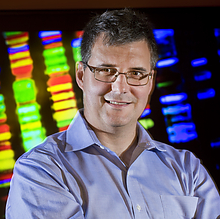 A computational biologist at the University of Maryland has just been named a Fellow of the Association for Computing Machinery (ACM), an elite recognition of outstanding science and scholarship that is bestowed upon less than one percent of the organization’s 100,000-plus members.
A computational biologist at the University of Maryland has just been named a Fellow of the Association for Computing Machinery (ACM), an elite recognition of outstanding science and scholarship that is bestowed upon less than one percent of the organization’s 100,000-plus members.
Mihai Pop, a professor of computer science and director of the University of Maryland Institute for Advanced Computer Studies (UMIACS), is one of only 58 researchers worldwide who were named ACM Fellows for 2019.
In announcing this year’s cohort of Fellows, ACM President Cherri M. Pancake noted that “computing technology has a tremendous impact in shaping how we live and work today. All of the technologies that directly or indirectly influence us are the result of countless hours of hard work, creative inspiration, and—at times—informed risk-taking. Each year, we look forward to welcoming some of the most outstanding individuals as Fellows.”
Pop and the other Fellows will be formally honored at the ACM annual awards banquet, to be held in June 2020 in San Francisco.
In recognizing Pop’s scientific achievements, ACM officials cited his contributions to computational biology, algorithms, and software for DNA sequence analysis and sequence assembly.
“Mihai continues to excel as a leading scientist and scholar in research that has a direct impact on human health,” says Amitabh Varshney, dean of the College of Computer, Mathematical, and Natural Sciences. “The university, and the scientific community at large, are fortunate to have access to his work that combines powerful computing tools with new knowledge derived from the human genome.”
Pop’s scientific interests cover several areas of bioinformatics, primarily related to the development of computational algorithms for analyzing biological data generated by high-throughput experimental techniques, such as sequencing technologies.
Part of this research focuses on the computational analysis of the microbial communities inhabiting our world and our bodies—a scientific field called metagenomics. Pop’s lab, part of UMIACS' Center for Bioinformatics and Computational Biology, has developed a number of software tools that are now widely used in the field. He has also been an active participant in a number of large-scale, multinational projects, including the Human Microbiome Project and the GEMS study of diarrheal disease in children from the developing world.
In 2018, Pop made Clarivate Analytics’ list of Highly Cited Researchers, a compilation of influential names in science whose published work in their specialty areas has consistently been judged by their peers to be of particular use and significance. He was also included in the 2014 list.
In his role as director of UMIACS, Pop helps guide a research powerhouse of more than 80 faculty and 200 graduate students that hail from six colleges and schools across the UMD campus. The institute brought in more than $27 million in external funding this year, and in addition to longstanding research programs involving computer vision, cybersecurity, bioinformatics, and natural language processing, has significantly expanded its efforts in emerging areas of research like quantum information science and machine learning.
An active educator and mentor, Pop currently advises eight graduate students. He previously worked with 11 graduate students and four postdocs, and he spent three years as a faculty adviser to a group of UMD freshmen that analyzed the genome of the diamondback terrapin, the university’s mascot.
Pop earned his B.S. in computer science from University Politehnica of Bucharest in Romania in 1994 and his M.S.E. and Ph.D. in computer science from Johns Hopkins University in 1998 and 2000. He has been at the University of Maryland since 2005.